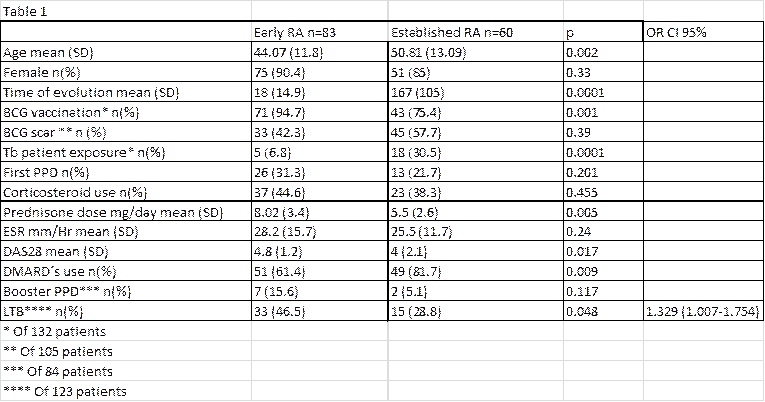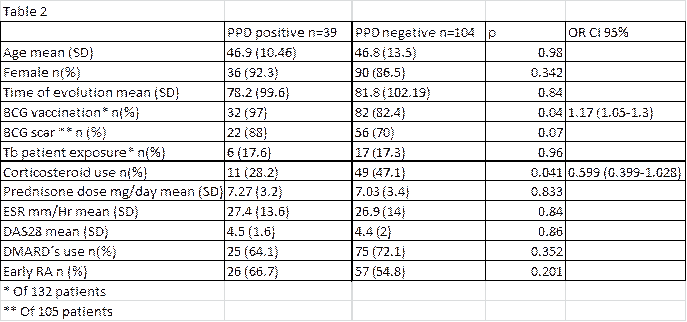Session Information
Session Type: Abstract Submissions (ACR)
Background/Purpose: Tuberculosis (TB) remains a major global health problem. Chronic inflammation in Rheumatoid Arthritis (RA) and the use of immunosuppressive drugs, increase the risk of reactivation of latent TB (LTB). Although other tests are available, tuberculin skin test (TST) is widely used method which detects LTB. There are reports that the TST response is decreased in RA. TST sensitivity may be increased by a second test done 1–4 weeks after the first, referred as the “booster” phenomenon.
The purpose of our study was to evaluate the TST and booster reactivity in patients with RA divided by the time evolution.
Methods: A cross-sectional analytical study was conducted. Patients who fulfilled the RA ACR/EULAR 2010 classification were included. Five Units of PPD CT-68 were administered with the Mantoux technique. Indurations equal to or greater than 5 mm were considered positive. Patients with negative reactions were scheduled within 15 days for a booster application. We reviewed clinical records and settled a database for analysis using SPSS v. 20.
Results: We analyzed 143 patients, 126 (88.1%) were females, with a mean age of 46.9 (SD 12.8); 60 (42%) had current use of corticosteroids, with a mean dose of 7.07 mg/day (SD 3.3). One hundred patients (69.9%) had a current use of DMARDxs. The mean DAS28 was 4.5 (SD 1.9). In first TST application there were 39 patients (27.3%) with a positive test (PT). Of the negative patients, 84 (81 %) had the booster application, 9 (10.7 %) of them had a PT. On table 1 is the bivariate analysis between early RA (<52 weeks) and established RA, on table 2 for the first TST positivity ad on table 3 for the booster positivity. At the end we have a LTB prevalence of 33.6%. There was an increased prevalence on the early RA group (OR 1.3 CI 95% (1.007-1.7) p = 0.04).
Conclusion: There are more probability to diagnose LTB in the early RA group, maybe influenced by evolution time and the corticosteroid and DMARDxs use.
Disclosure:
L. Perez-Barbosa,
None;
D. Vega-Morales,
None;
J. C. L. Riega-Torres,
None;
O. Ilizaliturri-Guerra,
None;
M. A. Garza-Elizondo,
None.
« Back to 2013 ACR/ARHP Annual Meeting
ACR Meeting Abstracts - https://acrabstracts.org/abstract/tuberculin-skin-test-and-booster-phenomenon-in-a-rheumatoid-arthritis-population-differences-between-early-and-established-disease/



